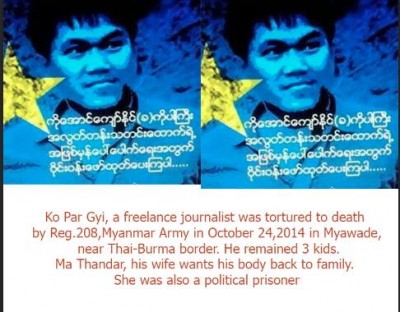
Many online activists used this photo as their Facebook profile photo. The Burmese script reads “everyone get involved to reveal the truth about the freelance reporter Ko Aung Kyaw Naing @ Ko Par Gyi”
The mysterious death of Ko Aung Kyaw Naing, a journalist widely known as Ko Par Gyi, has sparked anger among many in the Southeast Asian country.
Ko Par Gyi, who previously had served as a bodyguard for Aung San Suu Kyi, was covering recent clashes between the Myanmar Army and armed forces of the Karen minority rebel group in Mon State when he was detained by the Myanmar army on September 30. After three weeks, army officials notified the Interim Myanmar Press Council that the freelance reporter was killed on Oct. 4, while in their custody, and that his body has been buried already.
The death of the reporter while in the hands of the military outraged many and led to a gathering of more than 1000 people in downtown Yangon, the country's capital, on Oct. 26. Concerned citizens, activists and roughly 46 civil society groups have since united to call for an investigation into the death of the reporter. According to Radio Free Asia, approximately 20 protesters were arrested and being charged under an unspecified section of the penal code.
An official military report indicates that Ko Par Gyi was accused of serving as a “communications captain” of the Karen armed opposition group (DKBA – Democratic Karen Benevolent Army) and that he was shot when he tried to seize a gun from a guard, in an effort to escape the prison. Both Karen leaders and the family of the victim assert that he was not associated with the group.
The journalist's wife, Than Dar, a pro-democracy activist, is skeptical of the military's claim that her husband attempted to escape prison. She fears he was tortured and killed, and has demanded a full investigation of his death, including an exhumation and autopsy on his cadaver.
Myanmar's military junta has been in power since 1962, although democratic reforms were implemented in recent years. Today, a civilian government exists but the military continues to wield considerable power and influence in the bureaucracy.
Min Ko Naing from the 88 Generation Peace and Open Society thinks that the army has been given too much authority without making them accountable for their actions. Speaking during the protest, he cited provisions in the Constitution that protect the army:
Think about it carefully; the fact that there is a law in the constitution which states that if anyone from the army — from the rank of a soldier to the general — commits any kind of crime, the civil court cannot judge; it means that they have too much privilege, and this is a bully.
Ko Ko Gyi, a political activist from the same organization, feels that there is no rule of law or security in the country. He said:
Just look at the statement of the Defense Ministry. He was arrested on 30th (September), and killed on 4th (October); his wife inquired about him on 19th (October) but they did not answer anything and then only released a statement on 24th (October). It almost took a month, more than 20 days. Who is to take responsibility for this?
Nay Myo Zin from Myanmar Social Development Organization believes that the military's pledge to provide compensation to the family of the slain journalist could mean that “citizens are not worth more than a bullet.”
Moethee Zun, a political activist and founder of Democratic Party for a New Society, said that the army should not have killed him even if he was trying to flee:
It is obvious that Ko Par Gyi has never held a gun. He is a good and responsible person. Even if he had a gun, they (the army) should not have done that to him.
Blogger Moe Zay Nyein also thinks [my] that the army's accusation is not credible.
Ko Par Gyi was not someone who is afraid of prisons. His wife was also a political prisoner. He knew that he would be released again if he went to jail. In this age of democracy, he knew that there are people who would support him if he were ever sent to prison. He was familiar with the concept of imprisonment. Therefore, it is absolutely not believable that he tried to seize a gun in order to run and escape imprisonment.
Moe Thway from Generation Wave, one of the organizers of the protest, urged people to support reporters.
During the time when we did not have media freedom, political activists were the reporters. Even the wife of Ko Par Gyi was once sentenced to life imprisonment for writing political articles. If they did not risk their lives, we would never know the truth. Therefore, instead of calling them simply as reporters or political activists, the people should protect those who are trying to bring the truth to us.
This latest killing once again illustrates the critical need for the protection of media practitioners in the country. Although the censorship board has been abolished, the death of Ko Par Gyi is a grim reminder of the continuing limitations on media freedom and democracy in Myanmar.



